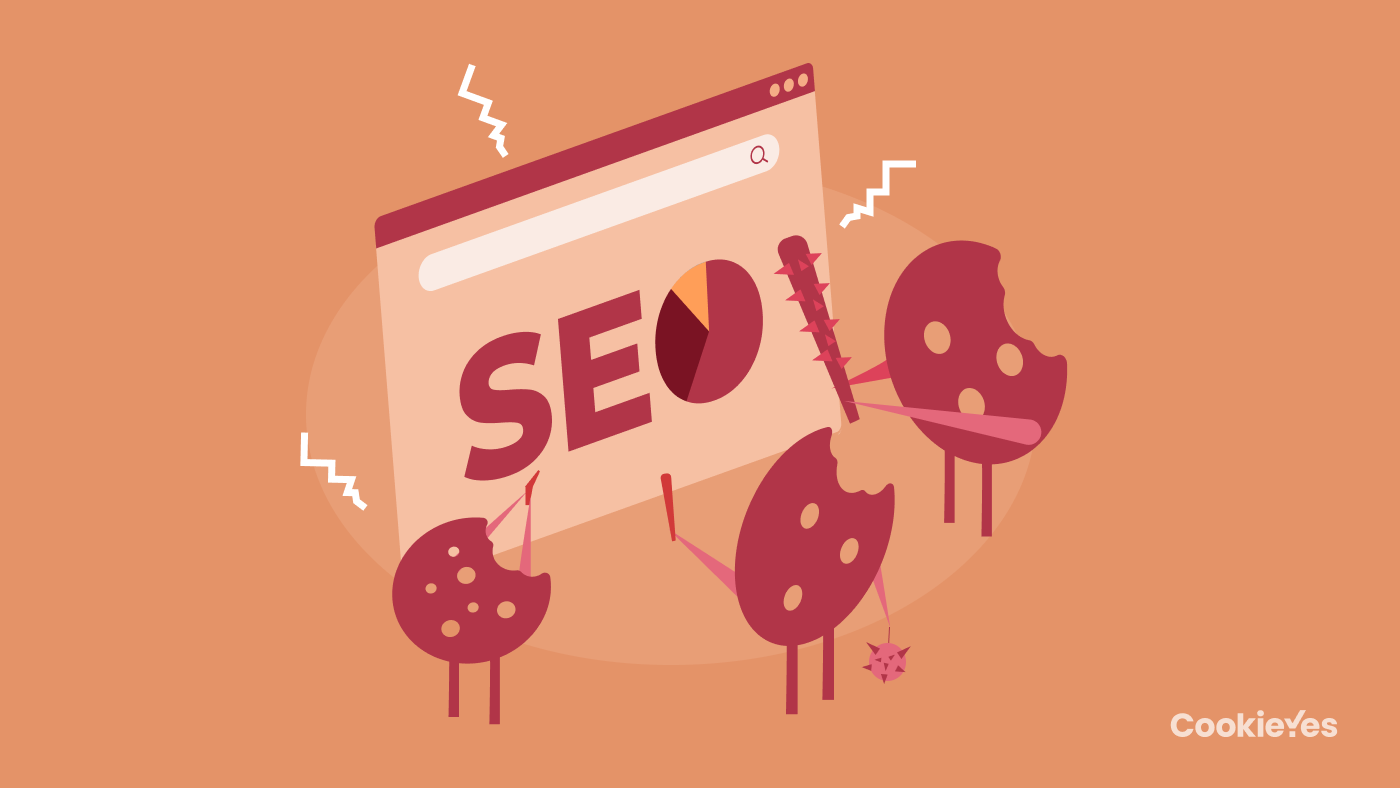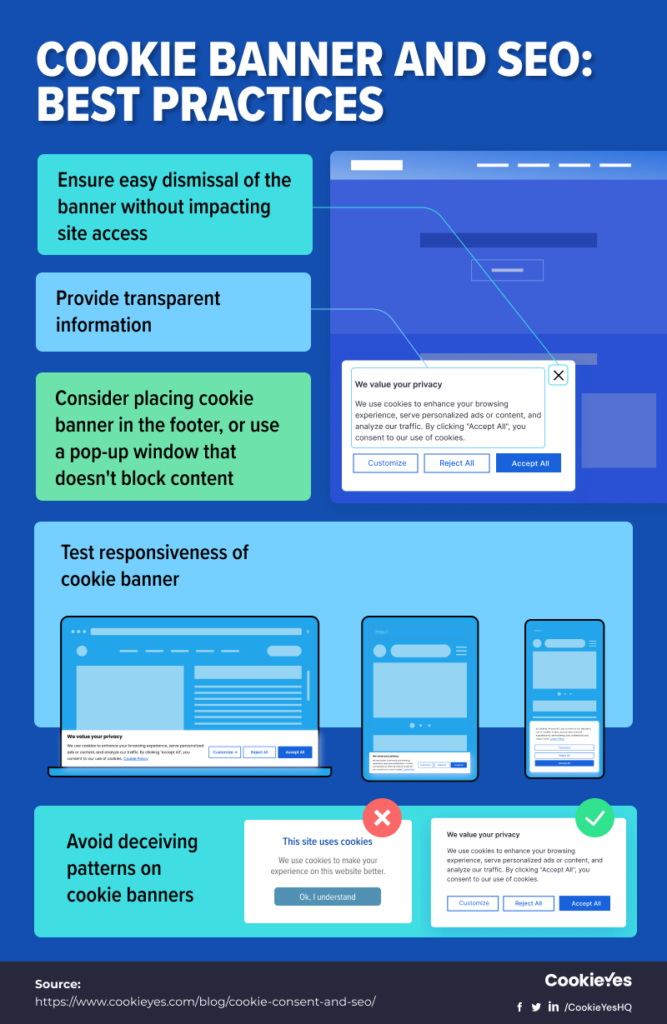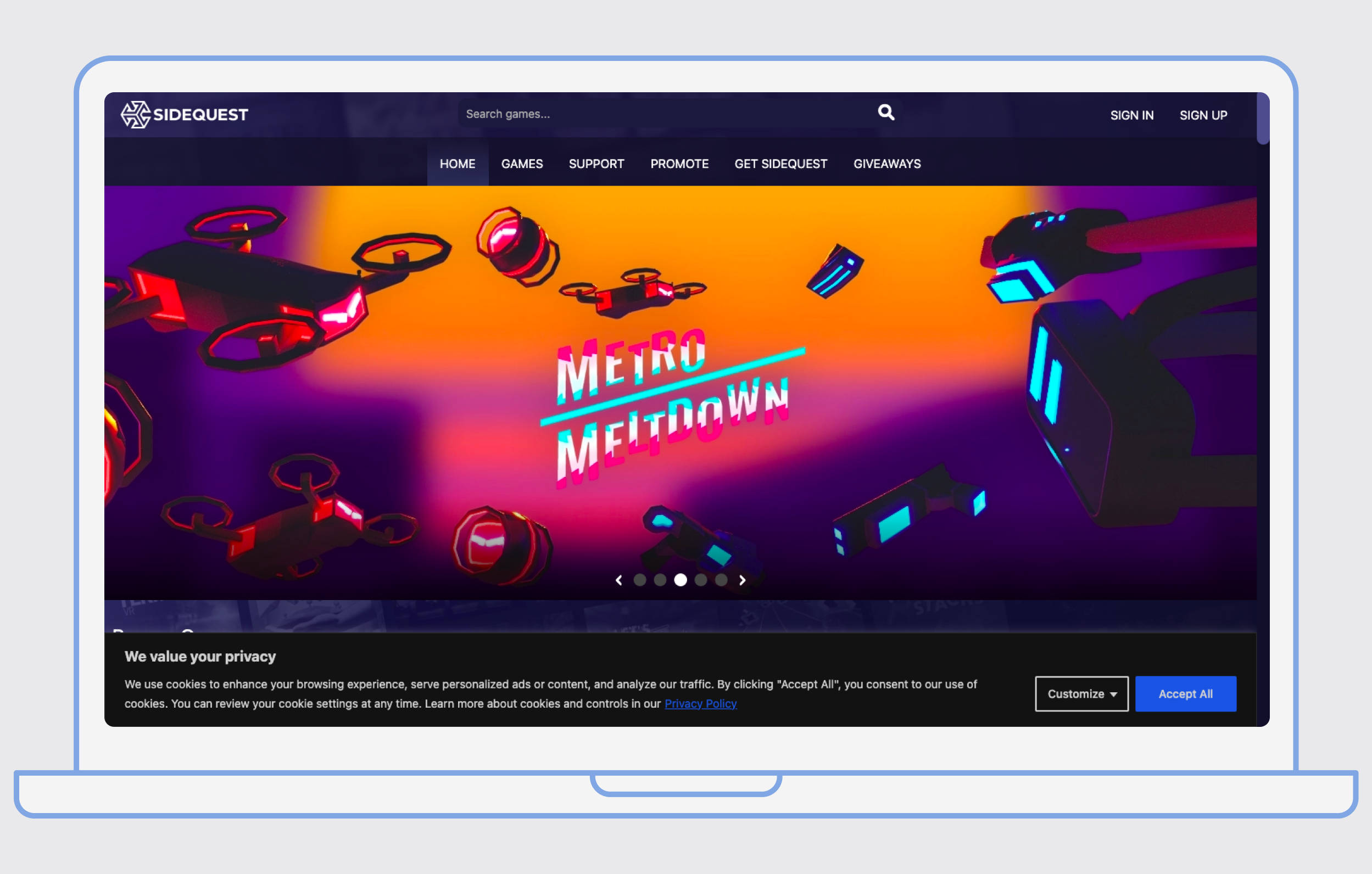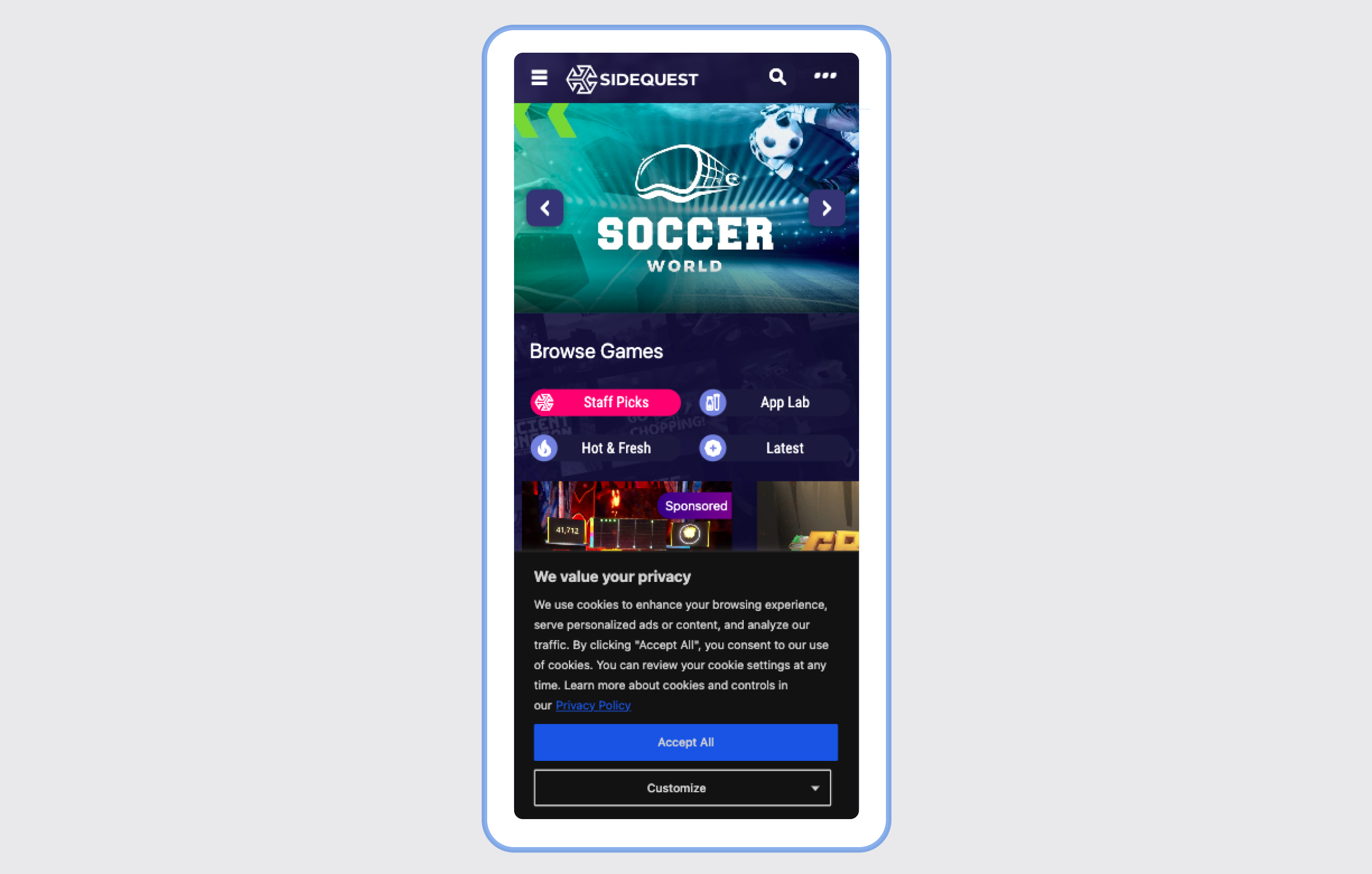Cookie consent is necessary, but is it worth compromising your search engine rankings? The good news is that cookie consent does not harm your site’s SEO if done correctly.
With Google putting the spotlight on page experience, including “intrusive elements that block web content”, it’s time to take a closer look. In this article, we’ll explore how cookie consent, particularly cookie banners, can impact SEO, and provide tips on how to implement a cookie consent mechanism that complies with privacy laws while also ensuring search engine visibility.
But first, let’s get up to speed on Google’s 2021 algorithm update and why it matters.
Insights from Google’s 2021 Page Experience update
Google is the world’s most-used search engine. Any modification to its search algorithm can significantly impact your website’s search performance.
In June 2021, Google released a core algorithm update called “The Page Experience Update” that prioritizes pages with quality page performance. The update introduced Core Web Vitals, a set of metrics that measure real-world user experience for loading performance, interactivity, and visual stability of a page. Therefore, page experience can be more important for visibility in search and the signals for measurement include Core Web Vitals, mobile-friendliness, HTTPS security, and no intrusive interstitials.
While Google still prioritizes pages with quality information, in the case of pages with similar content, it will give preferences to the page with the better page experience.
Cookie consent vs SEO
From an SEO standpoint, the Page Experience update and it’s measuring metrics or “page experience signals” have highlighted the importance of page experience in determining search visibility. This means that in addition to quality content, you should prioritize optimizing for Core Web Vitals, mobile-friendliness, HTTPS security, and avoid intrusive interstitials to improve page experience and potentially improve your site’s search performance.
In particular, intrusive interstitials such as popups or other types of overlays that obscure the main content can negatively impact page experience and therefore search visibility. Google has stated that intrusive interstitials can make content less accessible, and you should avoid them if possible. Instead, you should use alternatives such as banners or inline forms that don’t block the main content. However, Google has specifically called out cookie consent banners as an example of an interstitial that would not be affected by this signal.

Therefore, as long as cookie consent banners are implemented responsibly, they shouldn’t negatively impact your search rankings. In fact, including a clear and prominent cookie consent banner on your site can actually help you comply with relevant privacy laws and build trust with your users.
Best practices for cookie consent with real-world examples
Implementing a cookie consent mechanism on your website is essential to comply with privacy laws, but it’s important to make sure that it doesn’t end up hurting your website’s SEO. Here are some tips to help you:
| Best practice | Why? | How CookieYes can help |
| Load the cookie banner script directly to the website’s HTML code. | Avoid using animations or slow-loading fonts. | CookieYes offers an easy setup guide to add the installation code directly into your website’s HTML header file. |
| Maintain the loading speed of the website. | It causes unexpected changes in website layout called layout shifts. | CookieYes avoids layout shifts and loads a fast font. You can also customize your banner layout and use CSS to add your preferred font for banner content. |
| Ensure easy dismissal of the banner without impacting site access. | For good user experience. | You can add a close button on your cookie banner installed using CookieYes. |
| Consider placing a cookie banner in the footer, or using a pop-up window that doesn’t block content. | Intrusive or large banners may result in penalties or a negative user experience. | CookieYes offers non-intrusive banner options with various positions (top, bottom, left, and right) and optimal sizes for a good user experience. |
| Provide transparent information. | Banners should clearly explain cookie use and link to the privacy policy. | CookieYes’ default banner information includes cookie categories and options to link to the privacy policy. |
| Test responsiveness of cookie banner. | To ensure it doesn’t interfere with the site’s functionality. | CookieYes’ banner adapts efficiently to all screen sizes. |
| Make banner content non-indexed. | To avoid indexing by web crawlers which could interfere with site SEO. | |
| For a good user experience. | A lightweight consent mechanism can prevent website slowdown. | CookieYes uses lightweight JavaScript and CDN for quick content delivery. |
| Avoid deceiving patterns on cookie banners. | Misleading language or design can negatively impact SEO. | CookieYes’ default design and content follow best practices, with options for customization. |
Here are some useful tips from web.dev for optimal cookie banner design:

Real-world examples of cookie consent banners that don’t harm SEO
Decathlon Assurance has a non-intrusive cookie interstitial that doesn’t block access to web content and you can easily dismiss it by clicking the “Refuser et fermer” link, without affecting the site’s functionality. It’s as simple as that.
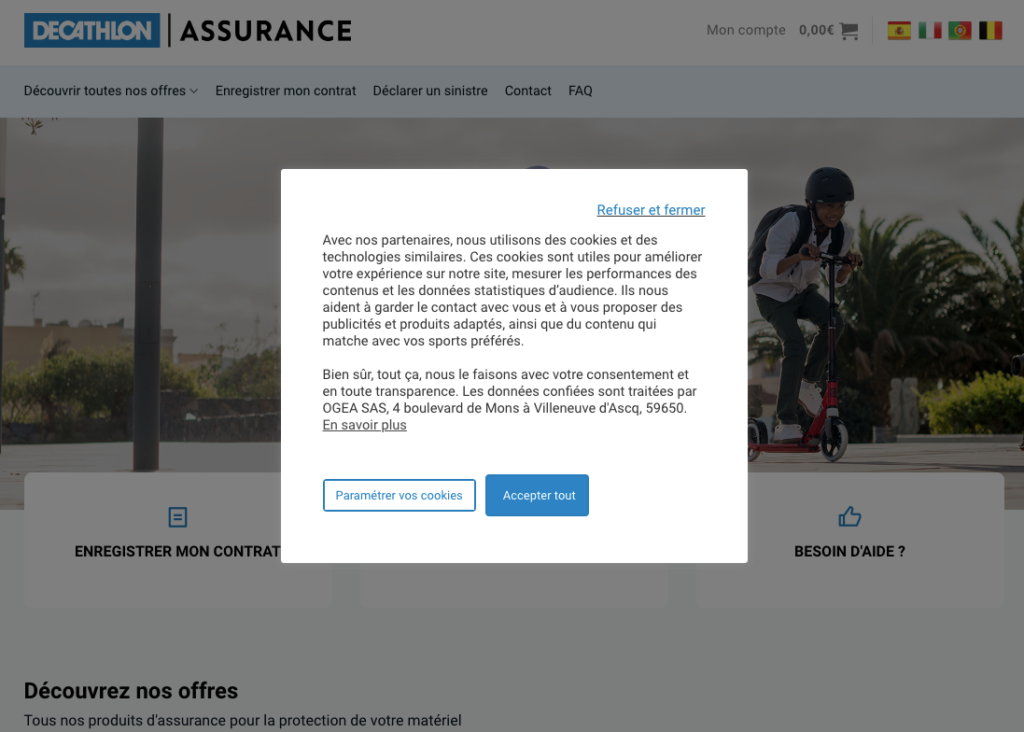
The adventure game, Goat Simulator 3, uses a cookie banner expertly placed at the bottom right corner of the screen, seamlessly integrating with the user interface design. The banner’s appropriate size ensures that it doesn’t block website content.

Unicef Ireland’s website uses a cookie popup that provides transparent information about what users can expect when they give consent to cookies. Clicking “Manage Cookies” takes you to detailed consent settings where you can selectively consent to cookies as per their categories.

Sidequest has a footer banner that perfectly matches its website UI and it adapts to every screen size without affecting the website content or causing any layout shifts. The banner does not incorporate any animation or fonts which usually slows down the loading process.
Here is how Sidequest’s cookie banner adapts to different screen sizes:
Get the best-in-class
cookie consent banner for your website
Try for free 14-day free trialCancel anytime
| Useful readings: Guide to cookie banners (with country-wise guidelines) |
Overall, cookie consent banners are an important part of ensuring your site is compliant with privacy laws and respects your users’ data. As long as you follow the best practices, you shouldn’t have to worry about cookie banners hurting your website’s SEO.
Frequently asked questions
Does cookie affect SEO?
Cookies themselves do not directly affect SEO. However, cookies are often used for website tracking and analytics, which can indirectly impact SEO. For example, tracking user behavior and preferences through cookies can help websites improve their user experience and tailor their content to meet users preferences. This, in turn, can lead to increased engagement and potentially improved SEO rankings. On the other hand, failing to comply with cookie regulations can result in penalties and decreased visibility in search engine results pages.
What is cookie consent?
Cookie consent refers to the explicit consent obtained by websites from visitors before placing cookies on their devices. Cookies contain information about the user’s browsing behavior, preferences, and other details that can be used to disclose visitors’ identities. Websites must obtain consent from users before collecting this data to comply with privacy laws like the GDPR.
What is a cookie in SEO?
Cookies do not directly affect the ranking of a website in search results. However, data gathered from cookies may be used to optimize the website and improve search performance.
Is cookie consent mandatory?
Yes, cookie consent is mandatory under various data protection laws like GDPR and CCPA if you use third-party cookies that collect or process personal data. Websites must obtain explicit consent from users before collecting and storing their personal data via cookies. Failure to obtain cookie consent can result in fines and other legal action.
